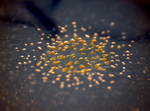Gliding motility is a type of translocation used by microorganisms that is independent of propulsive structures such as flagella, pili, and fimbriae. Gliding...
13 KB (1,590 words) - 06:11, 22 November 2024
rotating a helical prokaryotic flagellum) gliding motility swarming motility twitching motility, a form of motility used by bacteria to crawl over surfaces...
14 KB (1,628 words) - 23:29, 26 September 2024
bacteria migrating deeper via gliding motility. Researchers investigated if the CpAL/VirSR system regulates gliding motility. The study demonstrated that...
72 KB (7,998 words) - 20:09, 21 November 2024
Bacterial motility is the ability of bacteria to move independently using metabolic energy. Most motility mechanisms that evolved among bacteria also...
109 KB (12,267 words) - 17:52, 22 September 2024
Marine prokaryotes (section Gliding motility)
twitching motility is derived from the characteristic jerky and irregular motions of individual cells when viewed under the microscope. Gliding motility is a...
136 KB (12,705 words) - 16:07, 22 October 2024
Thiomargarita namibiensis (section Motility)
such as Thioploca and Beggiota, have gliding motility. However, Thiomargarita cells do not have gliding motility due to their shape. The vacuoles give...
43 KB (4,887 words) - 14:54, 21 November 2024
Adventurous motility is as a type of gliding motility; unlike most motility mechanisms, adventurous motility does not involve a flagellum. Gliding motility usually...
12 KB (1,525 words) - 07:45, 25 July 2023
Fukushima SI, Haruta S, et al. (January 2020). "Tree of motility - A proposed history of motility systems in the tree of life". Genes to Cells. 25 (1):...
180 KB (17,735 words) - 17:20, 13 November 2024
Microbiology. 111: 1–61. doi:10.1099/00221287-111-1-1. Hoiczyk, E. (2000). "Gliding motility in cyanobacteria: Observations and possible explanations". Archives...
69 KB (6,986 words) - 15:14, 22 August 2024
pneumoniae cells also possess an attachment organelle, which is used in the gliding motility of the organism by an unknown mechanism. Sequencing of the M. pneumoniae...
42 KB (4,675 words) - 11:32, 12 November 2024
Beggiatoa (section Morphology and motility)
nitrate. Beggiatoa move via gliding motility, using the excretion of mucus. The exact mechanisms of this gliding motility are unknown. In the species...
40 KB (4,907 words) - 09:05, 10 July 2024
gregarines for gliding motility and for invading target cells. This makes the gregarines excellent models for studying gliding motility, with the goal...
16 KB (1,854 words) - 21:07, 10 August 2024
Cytophaga hutchinsonii (section Gliding motility)
Cytophaga myxococcoides. Gliding motility, which is present throughout the Cytophaga-Flavobacteria group, is not well understood. Motility does not involve flagella...
8 KB (931 words) - 23:46, 13 March 2023
Amoeboid movement (redirect from Amoeba motility)
cells may also exhibit rapid transitions between amoeboid motility and mesenchymal motility, another form of cellular movement. Dictyostelium cells and...
17 KB (2,103 words) - 20:31, 14 September 2024
twitching motility that relies on a structure called the type IV pilus, and gliding motility, that uses other mechanisms. In twitching motility, the rod-like...
143 KB (15,534 words) - 20:00, 8 November 2024
micrometers in length and can travel as fast as 11 μm/s. They move via gliding motility, requiring a wettable surface or a viscous substrate, such as agar...
2 KB (256 words) - 16:01, 25 September 2024
lack of flagella. The feature of gliding motility alone has piqued the interest of many, since the role of gliding bacteria in soil ecology is poorly...
23 KB (2,911 words) - 11:45, 17 January 2023
Myxococcus xanthus (section Motility)
exhibits two main types of motility, known as A-motility and S-motility. A-motility (adventurous), otherwise known as "gliding," is a method of locomotion...
39 KB (4,492 words) - 18:02, 24 June 2024
Twitching motility is a form of crawling bacterial motility used to move over surfaces. Twitching is mediated by the activity of hair-like filaments called...
22 KB (2,651 words) - 07:12, 4 January 2024
this type of motility. Myxococcus xanthus ability to use gliding motility to move is very similar to Pseudomonas aeruginosa twitching motility.[1] Pseudomonas...
13 KB (1,622 words) - 17:59, 12 July 2024
are involved in this parasite's motility. Gaji et al. 2015 find TgCDPK3 is required to begin the action of motility because it phosphorylates T. gondii's...
105 KB (11,973 words) - 18:23, 17 November 2024
rapidly digests crystalline cellulose C. hutchinsonii is able to use its gliding motility to move quickly over surfaces. Although the mechanism for this is not...
4 KB (349 words) - 16:08, 23 January 2024
PMID 20736348. Kappe, Stefan H.I.; et al. (January 2004). "Apicomplexan gliding motility and host cell invasion: overhauling the motor model". Trends in Parasitology...
46 KB (4,906 words) - 12:05, 30 October 2024
is typically jerky, so it is called twitching motility, as opposed to other forms of bacterial motility such as that produced by flagella. However, some...
27 KB (2,862 words) - 21:05, 27 September 2024
gliders or sailplanes. Gliding may also refer to: Gliding flight, flight in the absence of thrust Gliding motility of microbes. Gliding (vehicle), a natural...
958 bytes (171 words) - 15:37, 29 August 2020
dependence on CO2 and "cytophaga" for its flexibility and mobility shift (gliding motility). It belongs to the family Flavobacteriaceae, order Flavobacteriales...
16 KB (1,802 words) - 18:52, 14 November 2024
both S- and A- (or gliding) motility, which provide transportation across a dynamic range of different surfaces. M. xanthus's A-motility is most effective...
83 KB (10,171 words) - 05:27, 18 November 2024
an outer membrane. The system is involved variably in one type of gliding motility, in the proper targeting of certain virulence factors to the cell surface...
29 KB (3,551 words) - 00:38, 13 September 2024
Flagellum (redirect from Flagellar motility)
spores (zoospores), and from a wide range of microorganisms to provide motility. Many protists with flagella are known as flagellates. A microorganism...
66 KB (7,259 words) - 04:52, 19 November 2024
contains the proteins MG219, MG200, MG386, and MG491 which aid in the gliding motility of the bacteria. Although Mgen lacks secreted virulence factors, the...
45 KB (4,970 words) - 16:04, 9 October 2024























